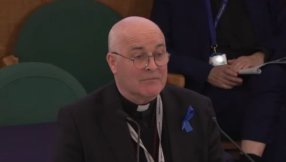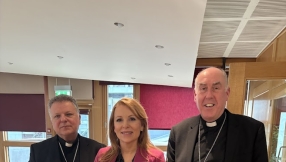
Recently I returned to my old school in a suburb of Liverpool. This was 52 years after I had left. A kosher meal was served and I met up once again with my former head teacher, as well as the head of French (who took up with me in French as if I were still 16 years old) and head of German, who also introduced us to Russian.
All of these ladies were now around 90 years old, and visiting brought back such amazing memories. I was the only Jewish girl in my class in this C of E school. Girls attended from a wide area, including poverty-stricken Bootle (now thankfully regenerated) to as far away as the sunny sea-side town of Southport, where I was brought up.
Primary schools had been, for the most part, dire, with antisemitism prevailing and low levels of attainment expected in girls growing up in the 50s.
But in 1960 I (only just) passed the exam to the junior section of this new school near Liverpool and was set on my future career of languages, history and poetry, seasoned with musical interludes. The only criterion for entry was brains and if you couldn't pay the government stepped in. These types of schools no longer exist, and my old school has become independent.
The head teacher was one of a kind. There were so many little acts of kindness – and far bigger ones too, when she sacked the RE teacher (a vicar from the Church over the road) for informing the class more than once in an Old Testament lesson that I had personally killed Jesus, and when she advised me in the Lower 6<sup>th to transfer to a school in Greater Manchester that would suit me better, but not the more obvious one which, she said, practised a 'numerus clausus' (Latin for a discriminatory quota system against Jewish girls). She was right on all counts.
Last month I asked my former head teacher, who after 52 years looks at least 20 years younger than her age, why she had been so good to me and to my family – giving my mother a job teaching French without formal papers – 'Well you do know that my grandparents came from Cheetham Hill, don't you?' No, I did not know. And neither did any one else. So, some Jewish connection there. And we girls, without exception, had always thought of this incredibly aristocratic being as coming from London (probably from the Knightsbridge area) and being related to the Queen, when in fact she had stemmed from an impoverished, working-class area of Manchester, where Jews and Irish co-mingled. Maybe she was actually one of us ... perish the thought! Oh, and we also thought at the time that she must be about 75 years old, but she was actually 33 when she started as Head, the youngest in England at the time.
But I have often thought of her since and of her amazing ability to bring out the best in people, especially when I was brought in as an emergency measure to teach PSHRE at schools not too far from Cheetham Hill in Manchester (round the corner from where I live now). When Tony Blair's Labour Government downgraded the teaching of languages in 2002, I was asked to concentrate on RE, but this also included a fair amount of what was then called Personal, Social, Health and Relationships Education (PSHRE). How to start on dealing with the subject of smoking – cigarettes, drugs of all sorts – you name it, and how to cope with the fact that not one person in the school I taught in East Manchester knew their fathers, and many didn't know their grandfathers either? And yet, we were supposed to be learning about 'the family'. But maleness was utterly taboo to many of the girls in my class.
Writing this article now – probably the hardest I have ever been commissioned to write – brought back thoughts about that time in my secondary school where at 12 we were introduced to the fairly new subject of sex education. An expert was brought in who really knew her stuff and whose main characteristic is what I would call 'intelligent empathy'. While providing us with all the pertinent facts, she also made us feel good about ourselves as young women for whom life would be a challenge, no doubt, but marvelous with it. And this first introduction to the subject has always inspired me. For relationships education is about relating in general and not, as it has now become, simply a tick-box obsession with sex.
What I learned from my Liverpool school was that if you put arguments clearly and factually, you will be heeded, and that love includes humour, as well as rigour and boundaries. Sadly, in many instances, this no longer seems to be the case, with the recent bunch of Conservative candidates for the leadership falling over themselves to privilege one point of view, for instance while seemingly aspiring to throw out the baby with the bath water (and frankly, the poor baby seems to be being left behind altogether in all this hullabuloo about matters which should strictly be left to the home)
Thankfully, there are some tiny pockets of good sense that have prevailed in the ongoing struggle with the educational authorities in this country. These last, as you know, have singularly failed to take into account the views of many people, certainly in the observant Jewish, Christian and other religious communities, as well as many who do not profess a religious belief but are simply advocating common sense in the teaching of relationships to infants from the age of 2 or 3 up to teenagers who in theory may be sent to die for our country at the age of 16.
I would like to come to the challenge from a slightly different angle which I don't think has been considered thus far. Having trained as a language teacher I know something about the development of the brain from babyhood until late teens. And these studies tend towards the view that young children find it very confusing to learn about themselves and their own backgrounds at the same time as having to imbibe lessons on competing and sometimes contradictory backgrounds to those that they will experience at home.
So, for instance, the Jewish primary school which recently tried to implement the new Ofsted rulings has found it practically impossible, and at the very least chaotic,to introduce role plays on families with a man and a woman as father and mother, at the same time as ingesting the idea of two women or two men adopting these roles.
Similarly, trying to learn about another religion when you are only just embarking on becoming aware of your own religious background is equally counterproductive. I first discovered this to my cost when, some 40 years ago I was invited by the local education authority to teach a group of primary school children and their parents about the extremely joyous Jewish festival of Purim (illustrated of course by copious amounts of delicious food relevant to Purim), only to be phoned by a delighted parent who informed me that her daughter was thrilled to have found out so much about the Muslim festival of Ramadan, and when was I going to do something on Judaism! Not to mention on Hinduism!
And this response somewhat begs the question. To most people today, religion means Islam, and the struggle seems to be between the gay agenda and the perceived Muslim agenda. But not all religions are alike. In many ways, the Jewish approach is scientific and pragmatic. And this is why so many great Jewish thinkers have also been medical practitioners who have not avoided issues. One such is the doctor deemed to have been the greatest post-biblical Jewish thinker of all time, Moses Maimonides (1135-1204). Maimonides was the personal physician to the Muslim caliph in Fustat, Old Cairo, and had no hesitation in condemning homosexual relations (including lesbianism) as 'wrong behaviour'. But he also made a few suggestions, such as avoiding too much exclusively same-sex interaction between individuals so I am sure he would have disapproved of the single-sex boarding school, or the monastical life-style.
On the other hand, Maimonides would have encouraged single-sex day-school education which has proved to be much better for girls and women, as long as people are brought up by their parents and their social and spiritual education not left entirely to the school authorities.
It is in any case a key tenet of observant Judaism that boys and girls should be educated separately, not least because boys and girls develop at separate rates and often need a different kind of teaching approach.
So where does all this come from?
The key biblical injunction is in Leviticus 18:22, where it states: 'Thou shalt not lie with a male as with a woman. It is a to'evah' The Hebrew word has often been translated as 'abomination', which has caused much hilarity in modern Church circles. Many have argued that just as Christians do not keep the Jewish food laws, so sexual prohibitions should also be disregarded. And just as people enjoy their 'prawn cocktails', in the same way, some have gone further in their approach to the book of Leviticus and ask why, if pork and prawns are now 'kosher' to everyone except observant Jews, should any type of sexual activity still remain taboo. I hear this argument all the time in mainstream church circles.
The term to'evah actually means a category error, as in the phrase ta'ah bah, 'he made a mistake in this action'. So 'abomination' must be a translation stemming from the early 17<sup>th century King James Bible, which had no Jewish input into its translation at all, nor did the large teams of translators appear to have examined Jewish sources on the matter (more's the pity!).
And one could also argue that for Jews eating non-kosher food is also a category error. But those Christians and others (especially those with an axe to grind) who take the line of least resistance by placing sex laws and food laws in the same category are not entirely correct. For Judaism has never argued that non-kosher food is bad for you, or that gentiles should refrain from eating their pork, oysters and lobster on toast. On the contrary, Jews have no idea why they alone are prohibited from eating non-kosher food, while people who aren't Jewish are welcome to eat it. In fact, gentiles may still regard themselves as fully obeying G-d's laws while tucking into their bacon butties, finished off with dollops of cream cheese, on Yom Kippur, while this behavior is strictly forbidden to Jews!
The seven so-called Noachide Laws laid down for non-Jewish people omit food laws altogether, but do advocate kindness to all animals. However, and by contrast, sexual immorality is included among the 7 rules for life enjoined on non-Jewish people.
In addition, although Jews have to obey the law of the land where they happen to be living, there are three cases where this obligation is overridden.
These three cases are murder (including carrying out or undergoing abortion unless the mother's life is in danger); idolatry and sexual immorality.
So what are religious people to do for whom single-sex education is part of their heritage and for whom sexual relationship education comes up against Ofsted and the Department of Education?
In order to answer this question, my first port of call was Chief Rabbi Mirvis. This is the response I received from his office yesterday, which I cite unedited in full. Reference is made to the Chief Rabbi's guide, which can be accessed here.
"The Orthodox Jewish view on homosexual relationships is widely known. The guide refers explicitly to the clear prohibition in Leviticus 18:22 and there is no part of the guide that can be interpreted as deviating from that position in any way. The purpose of the guide is to make clear that that position, and a deep sensitivity to (and care for) the lived experience of LGBT+ Jews, are not mutually exclusive.
"The guide seeks to expound on that principle in various ways and we encourage Jewish schools, falling under the auspices of the Chief Rabbi, to contact us, should they have specific queries about the use of specific materials in teaching their pupils about this topic."
The subject was broached to me in Israel as long ago as 2007 by the late Chief Rabbi of Haifa, Shear Yashuv Cohen (who has trained many people who went on to become Chief Rabbis in Europe, including two Chief Rabbis of the UK) when, pointing to an explicit photo in the Israeli equivalent of The Sun, he expressed the view that the present growth in same-sex behaviour (also gaining ground in Israel as you will see below) is much to be regretted and against Jewish law and teaching.
So my own response to the crisis currently facing Jewish and traditional Christian schools would be that there appear to be three main issues which should be separated out.
Firstly, there are a few people who are born with gender dysphoria and feel that they have not been correctly assigned. This situation has been discussed in Jewish sources, including in the Talmud, and compassionate encouragement offered to them to live life as they would want, including undergoing an operation if necessary.
Secondly, bullying should always be dealt with firmly in all schools.
Thirdly, however, fluid relations as part of a life-style choice (as in the case of abortion on demand) are antithetical to the Jewish religion, are condemned by Jewish law and cannot be taught to young people in schools as a simple choice similar to that between the colours purple and green, for instance. And from my own experience and many friendships, I think that this is also the case for Christians in traditional Christian schools.
Children are not young adults, and teenagers are going through enough stresses. The law as it is stipulated at present is not aimed at the best interests of the developing child and young adult. This type of muddled thinking and teaching will simply cause havoc in the minds of young people and increase the already-heavy burden on parents, mental health professionals and doctors, not to mention on teachers.
In my opinion, given the impasse between educational authorities and Jewish parents, one option could be civil disobedience, which is enjoined in Jewish law for an emergency case of this kind. Another option is to bring a court case against the Department of Education. And yet another, if these responses fail, is home schooling.
If I were a parent or grandparent of children attending school in this country today, I would probably opt for home schooling – since even the option of removing one's child from relationship education classes would simply label that child as grotesque. And why should we do this to our children and grandchildren?
So let me end with a couple of responses from people who have thought about this subject in depth. Former Archbishop of Canterbury, Dr Rowan Williams, offered a number of insights derived from his vast experience as priest and educator: "As for schools, I think it's important that (especially in primary schools) children should not be taught what is irrelevant or developmentally too complex for them. They can certainly be taught that everyone deserves respect and no-one should be exposed to contempt or violence. But a religious school should not be forced to teach as if there were *no* Jewish or Muslim or traditional Christian approach to these issues."
And these thoughts have been sent me from my former teacher at religious seminary in Jerusalem, Rabbi Dr Natan Cardozo, author of Jewish Law as Rebellion. Rabbi Cardozo is a world-renowned educator and thinker and his book can be accessed here.
Rabbi Cardozo, although advocating compassion and understanding, nevertheless wanted it clarified that:
"I think that if an educator does not mention that homosexuality as an alternative lifestyle is forbidden by Jewish Law than he or she has failed to state the truth.
"What I and some others are saying is that when a person is genetically and hormonally a homosexual than such a sexual relationship may be permitted.
"But to teach (young) people that they can make a choice whether they want to be an heterosexual or homosexual is forbidden. It is true that very young heterosexual people have some homosexual feelings which later in life seem to disappear, but this is not a genetically/hormonally homosexual.
"In my opinion it is therefore disgraceful when people demonstrate (such as in Tel Aviv) in order to advocate homosexuality as an alternative lifestyle. I am also deeply disturbed by the way in which they dress. It is a disgrace. They only embarrass themselves.
"The biggest problem in this issue is how we establish that somebody is indeed genetically and hormonally a homosexual.
"What many rabbis are saying is that in the meantime we need to accept this community with love and affection, but that does not mean that we can supply a general kosher stamp on the homosexual act as such."
And on the the current situation in Britain at present, these are his views:
"It is a complete puzzle to me that Britain suddenly seems to say that by law even homosexuality as an alternative lifestyle is to be recommended.
"I suppose that a large percentage of citizens are Christians and Muslims. Do they not have any influence to stop this policy?"
Yes, indeed. This is now up to us. Do we want to be forced into an educational cul-de-sac in which educators with an agenda run roughshod over millennia of Jewish values, often shared by Christians the world over, or do we just give in to vested interests?
I don't have all the answers. But as a parent and grandparent this principle would be something worth fighting for, I think. If we are prevented by law from teaching our children and grandchildren what we genuinely believe to be the correct way to live our lives, then it is not we who are being homophobic, but others who are being theophobic.
And in the end, religious communities and others who simply cannot bring themselves to carry out the government's rulings may have to end up educating their children at home. And if home education also ends up being forbidden, it won't only be Corbyn that forces the Jewish community to leave en masse. Because this is not the first time that governments have tried to force their hostile educational views on the Jewish community.
Many observant Jews are now publically comparing the behavior of the Department of Education and Ofsted to what their great-grandparents and grandparents experienced in Tzarist Russia, Nazi Germany and the communist Soviet Union. I have even heard rabbinical sermons on this subject. Sad to think that educationally this country may therefore be following in the footsteps of tyrants, murders and Jew-haters. Instead, what they should be doing is to safeguard the British values espoused with great success by the observant Jewish community, traditional Christians and others who have always tried their best for this country, but are presently being betrayed by political leaders, educationalists and other vested interests all in the name of ideology.
As to my own recent advice to girls and young women when asked on camera at my old school near Liverpool, I suggested that the three main goals for today's girls to consider are:
1) Not to be too thin
2) Having a regular source of one's own income
3) Remembering that foreign languages and music are not only good for the brain, but are actually what make the world go round.
Dr Irene Lancaster is a Jewish academic, author and translator who has established university courses on Jewish history, Jewish studies and the Hebrew Bible. She trained as a teacher in modern Languages and Religious Education and gained 1<sup>st prize as 'teacher of the year', and received a government bursary from Tony Blair's government for 'excellence in teaching.'













